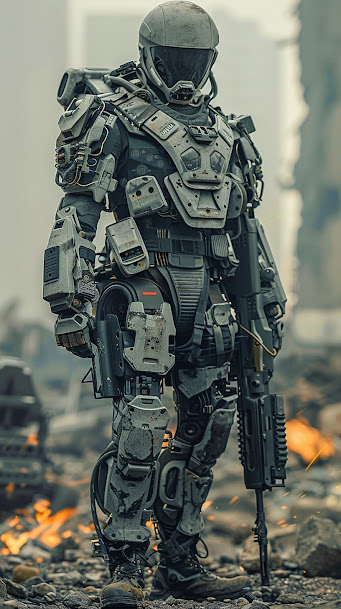Submitted Review: AI Is Taking Over Jobs – Are Humans Becoming Obsolete in the Workforce?
Introduction: The Robotic Elephant in the Room
Let’s stop pretending: AI isn’t the future—it’s the now. From warehouse robots to ChatGPT automating white-collar work, artificial intelligence is already replacing human jobs. And while Silicon Valley paints it as "innovation," many see something darker—a quiet, systemic elimination of the human workforce.
The biggest question no one wants to answer:
What happens when humans are no longer needed for work?
This isn’t science fiction. It’s happening in real time. Industries are adapting. Executives are cheering. Politicians are asleep. And the rest of us? We’re clinging to outdated degrees and jobs that may not exist in five years.
So, are we headed toward a tech-driven utopia where humans are freed from labor—or are we building a dystopia where usefulness equals survival, and the rest are left behind?
Section 1: The Job Apocalypse Has Already Begun
Blue Collar Beginnings: Robotics in Manufacturing and Retail
First came automation in factories. Now it’s everywhere:
-
Amazon’s Kiva robots process millions of packages a day.
-
Walmart’s inventory bots roam the aisles, replacing stock clerks.
-
McDonald’s is testing AI drive-thru ordering systems.
Tens of thousands of warehouse, retail, and fast-food jobs have been vaporized by automation—and we barely talk about it.
White Collar Wipeout: AI Is Coming for the “Safe” Jobs Too
AI was supposed to only threaten low-skill jobs. But in 2024, AI models are:
-
Writing legal contracts faster than paralegals.
-
Generating financial reports better than analysts.
-
Diagnosing medical images with higher accuracy than some doctors.
-
Creating marketing campaigns, code, music, and art—all once considered “safe” creative fields.
This is no longer just about truck drivers and cashiers. It’s about lawyers, designers, teachers, and coders.
No job is safe.
Section 2: The Numbers Don’t Lie – Millions Are At Risk
According to a 2024 report from Goldman Sachs:
“As many as 300 million jobs worldwide could be lost or reduced by AI.”
That’s 300 million people who may become economically irrelevant.
-
50% of routine office tasks are projected to be automatable by 2025.
-
40% of coding and development tasks can be done by AI models like GPT-4 and its successors.
-
AI tutors and chatbots are replacing teachers and call center workers at scale.
This isn’t speculation. It’s math. And the people affected the most? Middle class workers who once thought they were immune.
Section 3: The Lie of “AI Will Create More Jobs Than It Destroys”
You’ve heard it:
“Yes, AI will replace some jobs, but it will also create new ones!”
That’s the corporate slogan sold to keep the public calm. But let’s break it down:
The Truth: New Jobs Will Exist, But Not for Everyone
-
Yes, we’ll need AI engineers—but only a small elite few.
-
The demand for prompt engineers and AI trainers is real—but niche.
-
Most displaced workers won’t have the skills or access to re-enter the market at this level.
So while AI might create some jobs, it will also:
-
Widen the income gap
-
Destroy millions of careers permanently
-
Leave behind people with no path back in
It’s not a balancing act. It’s an economic decapitation of the working and middle class.
Section 4: What Happens When Humans Are No Longer “Useful”?
Here’s the darkest thought: If humans no longer add value to production—what are we worth in the eyes of a profit-driven system?
1. Loss of Identity and Purpose
Our identities have always been tied to our jobs. “What do you do for a living?” is the first question we ask strangers. Take away jobs, and what’s left?
2. Economic Displacement
No job = no income = no stability. Universal Basic Income (UBI) sounds great, but who’s paying for it? Tech companies? Governments drowning in debt?
3. Mass Surveillance and Control
An AI-run world isn’t just about efficiency—it’s about control. From automated policing to emotion-recognizing surveillance, the future looks less like Star Trek and more like Black Mirror.
Section 5: The Great Human Downgrade – From Creator to Consumer
AI doesn’t need sleep. Doesn’t take vacations. Doesn’t unionize. Doesn’t complain.
Which begs the question: Why keep hiring humans at all?
The vision of the elite class seems to be this:
-
Let AI produce everything.
-
Let humans consume endlessly.
-
Keep people pacified with content, subscriptions, UBI, and synthetic dopamine.
That’s not a workforce. That’s a managed class—and once you become dependent, you become controlled.
Section 6: The New Tech Elites – Gods Among Useless Eaters?
The AI revolution will produce unimaginable wealth—but only for a select few.
-
OpenAI, Google DeepMind, and Tesla are becoming the new kingdoms.
-
AI billionaires will control data, infrastructure, and governance.
-
Workers are powerless and invisible in this new pyramid.
We’re building a future where the top 0.1% will run the world, while the rest of us are told to “learn to code” or be “retrained” for jobs that don’t exist yet.
Section 7: Where Is the Resistance?
Why isn’t this being fought more aggressively?
-
Labor unions are outdated and slow to adapt.
-
Politicians are clueless or complicit.
-
Schools are still teaching 20th-century skills.
-
The media glorifies AI like it’s a miracle drug.
By the time resistance forms, it might be too late. The infrastructure of obsolescence will already be built.
Section 8: So, Will Humans Become Obsolete?
Short answer? Yes—economically, at least.
Unless massive reforms are implemented NOW, humans will:
-
Compete with machines that are smarter, faster, cheaper
-
Be pushed out of decision-making roles
-
Be turned into passive consumers, not contributors
This is more than a tech story. It’s a philosophical collapse of how we value human life, labor, and purpose.
Conclusion: We’re at a Crossroads—But No One’s Holding the Map
The AI train has left the station, and it's not slowing down. The question isn't if jobs will be lost—it's how society will respond when millions are left behind.
Will we build a world where humans matter regardless of productivity—or will we become irrelevant in a system that values only efficiency and output?
Time is short. The decisions made now will shape the next century.
Because when AI asks what we do for a living, the answer can’t be “nothing.”
Call to Action for Readers:
Share this article if you're tired of hearing the same old lies about AI and jobs.
Comment below if your industry is already being impacted.
Bookmark us for more brutally honest takes they won’t show you on CNBC.











Comments
Post a Comment